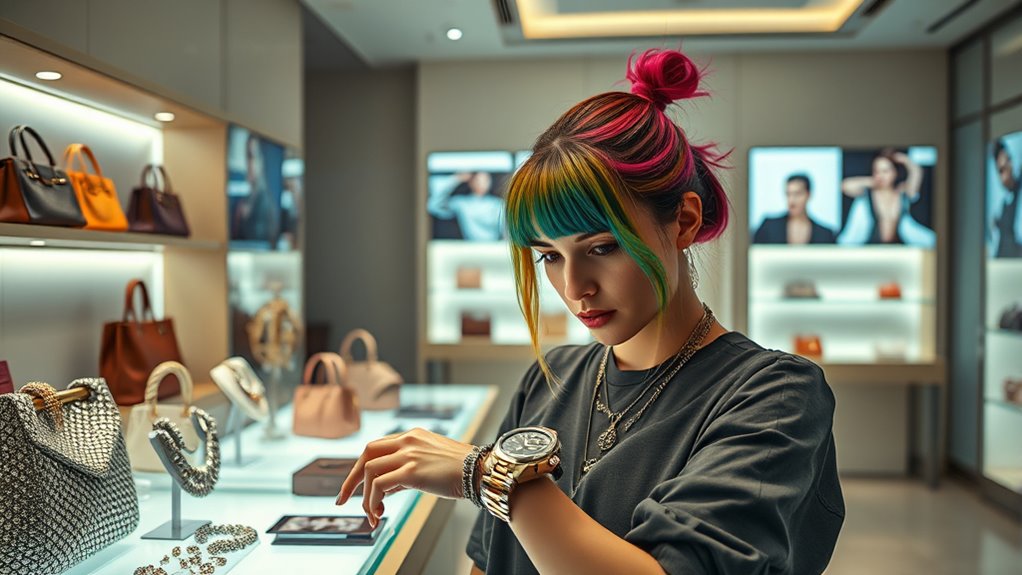To connect with Gen Z, focus on authentic storytelling that highlights sustainability, craftsmanship, and social impact. Use social media platforms like TikTok and Instagram to showcase your brand’s values and collaborate with influencers who genuinely align with your message. Balance exclusivity with transparency, allowing digital sharing without losing your brand’s essence. If you want to discover how to craft messages that resonate and how to adapt your approach, keep exploring these strategies.

The luxury sector is facing a pivotal shift as Generation Z’s influence grows rapidly. You might not realize it yet, but this generation’s collective disposable income is already around $360 billion in 2025, and by 2030, they’re projected to account for a quarter to nearly a third of luxury purchases. This means their preferences and values are reshaping how brands should operate. If you’re not adapting to their emphasis on sustainability, authenticity, and digital engagement, you risk losing relevance and a significant portion of your customer base over time. It’s no longer enough to rely solely on traditional exclusivity; Gen Z demands brands that resonate with their social and environmental values, and that’s a challenge you must face head-on.
Social media is your most powerful tool to connect with Gen Z. Platforms like Instagram, TikTok, and Snapchat aren’t just channels—they’re the gateways that expose your brand to millions of young consumers. Collaborations with influencers, such as Louis Vuitton partnering with Emma Chamberlain, showcase how influencer marketing can drive interest and brand relevance. Creative campaigns that fuse luxury with digital culture—think Prada’s Snapchat Bitmoji customization—are essential for capturing attention. But social media isn’t just about visibility; it’s also about accountability. Gen Z expects brands to be transparent on ethical issues, from anti-fur campaigns to sustainable sourcing. If your brand isn’t aligning with these values, you risk alienating this socially conscious audience. Additionally, engaging with evidence-based insights can help brands refine their messaging and strengthen their connection with this demographic.
Social media is key to engaging Gen Z through influencer collaborations and transparent ethical practices.
Authenticity is your currency in winning Gen Z’s trust. They’re drawn to genuine voices like Amelia Dimoldenberg, who offer relatable and honest perspectives. Collaborations that blend luxury with streetwear or outdoor brands, such as North Face x Gucci, attract younger consumers seeking authenticity and relevance. Beyond collaborations, your storytelling must emphasize sustainability, craftsmanship, and unique experiences—elements that redefine luxury for a new generation. Millennials and Gen Z are not just consumers; they’re redefining what luxury means, prioritizing personal meaning and social impact over traditional notions of exclusivity.
However, balancing exclusivity with Gen Z’s digital culture of sharing remains a critical challenge. The luxury market shrank by 3% early in 2025, losing around 50 million customers, partly because brands have been hesitant to embrace transparency and openness. Gen Z’s desire to share experiences online conflicts with the traditional idea of exclusivity, demanding innovation from brands to maintain emotional bonds without sacrificing their digital expression. Rethinking how you create and communicate exclusivity can help bridge this gap.
Additionally, understanding the importance of innovation in IP protection is crucial in safeguarding your unique designs and collaborations. The evolving landscape of intellectual property rights offers brands opportunities to develop protectable, Gen Z-friendly designs that resonate with their values while maintaining legal safeguards. Finally, Gen Z questions the value behind high prices and brand authenticity. Their spending is shifting toward experiential luxury, like hospitality and events, rather than just tangible goods. They’re also highly attuned to sustainability and ethical practices, actively supporting brands that align with their values. If you want to thrive, you must define a clear purpose and adapt your strategies—embracing modern creativity, transparency, and social relevance—to stay aligned with this generation’s evolving expectations.
Frequently Asked Questions
How Does Gen-Z Define Luxury Differently From Previous Generations?
You see luxury as a way to express your identity, not just show off wealth. Unlike previous generations, you value authenticity, sustainability, and emotional connection more than status symbols. You prefer brands that share your values and fit your community. Digital platforms like TikTok shape your view of luxury as participation and cultural fluency. For you, luxury is about meaningful engagement, quality, and aligning with your personal and social identity.
What Specific Marketing Strategies Resonate With Gen-Z Consumers?
You should focus on authenticity and transparency, sharing real stories and behind-the-scenes content that showcase your brand’s values. Use immersive digital experiences like AR, NFTs, and short-form videos on TikTok and Instagram Reels to engage them. Build genuine influencer partnerships that reflect diversity and inclusivity. Ultimately, craft personalized, culturally relevant narratives emphasizing responsibility, wellness, and connection to foster loyalty and resonate deeply with Gen Z consumers.
How Can Brands Authentically Engage Gen-Z Without Seeming Inauthentic?
You can authentically engage Gen Z by being transparent about your values and practices, showing genuine commitment to sustainability and ethics. Use micro-influencers and real customer stories to build trust, and create interactive, personalized experiences that make them feel valued. Avoid superficial messaging; instead, foster communities where they can co-create and share their opinions. Consistently demonstrate accountability and listen actively to their feedback to build lasting authenticity.
What Role Does Social Media Influence Play in Gen-Z Luxury Purchasing?
Imagine a vibrant marketplace where every whisper and shout shapes your choices—that’s social media for Gen Z luxury buyers. It influences your perception of brands through peer reviews, influencer stories, and sustainability highlights. You’re drawn to authentic, emotionally resonant content that reflects your values. When brands leverage social media effectively, you’re more likely to discover, trust, and purchase luxury items that align with your identity and social consciousness.
How Can Luxury Brands Adapt to Gen-Z’s Sustainability Expectations?
You can adapt to Gen Z’s sustainability expectations by being transparent about your supply chain, using blockchain for traceability, and showcasing genuine efforts in eco-friendly materials and circular practices. Engage them digitally with immersive experiences like AR and virtual try-ons, and share authentic stories of your sustainability journey. Collaborate with influencers who align with your values, ensuring your messaging feels relatable and trustworthy, ultimately building loyalty through meaningful, systemic sustainability commitments.
Conclusion
So, here’s the irony: your luxury brand might be desperately trying to appeal to Gen Z, yet it’s often stuck using the same old playbook. You want to seem fresh and authentic, but sometimes all it takes is a genuine story or a little humility. Maybe the key isn’t more glitz, but listening. After all, the very generation you’re trying to impress can spot a fake from a mile away—and they’re not afraid to call you out.









